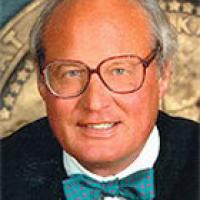
Thomas Fulton Crosby, Jr.
June 4, 1940 - January 23, 2004
Judge, Orange County Superior Court, 1981-1982
Associate Justice, Court of Appeal, 4th District, Division 3, 1982-2001
Thomas F. (Tom) Crosby was born in Long Beach, California. An assiduous student, Crosby got mostly A’s at Wilson High School, where he also played varsity basketball. After graduating from Stanford University, Crosby received his juris doctorate degree from the University of California, Berkeley School of Law in 1965. He spent two years with the Peace Corps in Arequipa, Peru. While in Peru, Crosby not only did community development work, but also taught Jurisprudence and Conflict of Laws at the University of Peru School of Law.
Upon his return to the United States, Crosby worked briefly as a deputy district attorney in Orange County from 1968 to 1973, then as a partner at two firms — Crosby & Luesebrink and Crosby, Garey & Bonner — before running his own private practice in Newport Beach from 1978 to 1981, where he concentrated on criminal defense.
In 1981, Governor Jerry Brown appointed Crosby to the Orange County Superior Court. Thirteen months later, Brown elevated Crosby to be an associate justice at the newly formed Fourth Appellate District, Division Three. Crosby remained at the court for two decades.
Crosby firmly believed in promoting access and transparency in judicial proceedings. In 1983, he wrote an opinion affirming a newspaper’s right to criticize judicial rulings: “A newspaper is perfectly free to opine that court orders are illegal and to criticize judges for violating the rights of innocent persons and exceeding their authority.” (Grillo v. Smith (1983) 144 Cal.App.3d 868.) In 1998, he led the court in requiring oral argument on dispositive law-and-motion matters. “Cold words on a printed page are not the same as a live presentation.” (Mediterranean Construction Co. v. State Farm Fire & Casualty Co. (1998) 66 Cal.App.4th 257.) “We do not subscribe to the obscurantist notion that justice, like wild mushrooms, thrives on manure in the dark.” (Titmas v. Superior Court (2001) 87 Cal.App.4th 738.)
In a matter of first impression, Crosby expanded on the role of the exclusionary rule in high school disciplinary cases: “The social cost in terms of harm to other students, to say nothing of the damage to the morale of parents and teachers, is too dear.” (Gordon v. Santa Ana Unified School Dist. (1984) 162 Cal.App.3d 530.)
Crosby was most proud of a 1994 decision he wrote overturning the City of Santa Ana’s anti-camping ordinance, a decision itself reversed by the California Supreme Court. In Tobe v. City of Santa Ana (1994) 27 Cal.Rptr.2d 386, rev. granted, Crosby wrote, “The attack [on homelessness] must be on the cause, not the victims; for they in the main are no more content with their circumstances than anyone else is.” He later authored an opinion recognizing the defense of necessity in criminal prosecutions of homeless persons for sleeping in public. (In re Eichorn (1998) 69 Cal.App.4th 382.)
Crosby was fairly nonplussed when Tobe or some of his other cutting edge opinions were vacated by the California Supreme Court. (See, also Randall v. Orange County Council (1994) 28 Cal.Rptr.2d 53, rev. granted [Boy Scouts cannot exclude atheists]; People v. Janini (1999) 89 Cal.Rptr.2d 244, opn. depub. [reversing prostitution convictions for lap dancing].) Indeed, he would joke that the California Supreme Court had assigned a full-time staffer just to monitor his decisions.
Crosby had what his colleague and friend Justice Ed Wallin called a “tart pen.” For example, he issued an opinion affirming the dismissal of a season ticketholder’s fraud claim against the L.A. Rams by observing: “It is common knowledge that professional sports franchisees have a sordid history of arrogant disdain for the consumers of the product.” In dissenting on an environmental case, he depicted Orange County as a place “whose history displays a distinct preference for tract homes and asphalt to meadows and trees. . . .” (Fund for Environmental Defense v. County of Orange (1988) 204 Cal.App.3d 1538.)
Crosby’s favorite expression, “It’ll make you crazy if you let it.” As he wrote in one of his opinions, “Sometimes you eat the bear, and sometimes the bear eats you.” (Long v. Valentino (1989) 216 Cal.App.4th 1287.) Fellow Justice Bill Bedsworth said he had a “blast furnace of a heart. His mind made him good. His heart made him great.” Upon his retirement, L.A. Times columnist Jerry Hicks wrote, “the court may be losing its most gifted writer.”
On Crosby’s final day at the court, the entire court staff (justices, judicial attorneys and deputy clerks alike), assembled in the courtroom for a group photograph. In tribute to Crosby’s omnipresent neckwear, each person in the photograph sported a bow tie.
Crosby’s retirement was short-lived. Of his death at age 63, Justice Arthur Gilbert wrote, “People like Tom don’t merely ‘pass away.’ Tom is still there, in your face, challenging you to think and to be honest. Tom had much to say on every topic and issue known to humankind. His words reflect his character, wit, imagination, wisdom, compassion and intellect.”
Volume 116 of the Official California Appellate Reports contains a memorial tribute to Tom Crosby. (See 116 Cal.App.4th 1420-1441.)